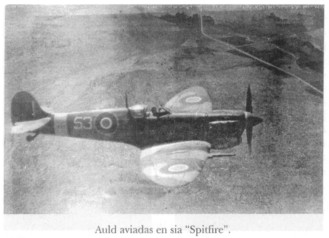William Auld—From Introduction
to Esperanto to Military Service
“Do you know
anything about Esperanto?” I inquired of my scoutmaster.
“I
can give you a textbook,” he replied.
So he gave
me Step by Step in Esperanto by Montagu C. Butler which, in my view, is
the best Esperanto textbook for English speakers, and it’s gone through nine editions
to date. I read the whole thing, willy-nilly absorbed the language, and never
abandoned it. Even during the war, when I served in the military, I had two books:
Step by Step and the Edinburgh dictionary.
But
at that age I did not come into contact with other Esperantists, and as with many
other things, Esperanto was for me a theoretical matter. But when I was 16, I
became friends with John Francis, my fellow student in Helensburgh, where he relocated
with his widowed mother due to the start of the war. We became the closest of
friends, and he learned Esperanto on my recommendation. We began to use Esperanto
between ourselves. And we continued doing so when we both joined the air force
(he was a bomber pilot). My mother bought the Holy Bible in Esperanto so that
I would finally get religion, because she did not approve of the fact that I am
an atheist.
*
* *
When the war came the school
was provisionally closed, and my parents moved to Helensburgh, 20 miles west of
Glasgow, and I went to high school for three years.
I
was drawn to aviation, and while I was an adolescent, my father—who was wounded
in the First World War—while conversing with his war buddies, talked about the
approaching war.
“Bill too is going to fight
in our corps,” said one of the guests.
“Oh no,
he is going to fly,” my father replied.
His words
proved prophetic. In Helensburgh I joined a youth flying corps, which was similar
to the Scouts movement for the British air force.
In
1942, following graduation from secondary school in Helensburgh, I enrolled in
the University of Glasgow. At the same time I joined the army, and because of
voluntary enlistment I was able to choose the air force, because I wanted to fly,
and I could not join the air force if I were drafted.
I
joined the air force in November 1942, when I was 18 years old. I trained as a
pilot in Rhodesia for more than six months. Afterwards, I simultaneously became
a pilot and an officer.
In 1944 I successfully won out
over fifty candidates for the one position for a pilot in a “Spitfire” for “high
altitude espionage”—i.e. observation and photography from an altitude of up to
40,000 feet (= 12 km). Another task was to direct the artillery attacks. An excellent
airplane! I spy-piloted and took photos until the end of the war, in North Africa,
the Near and Middle East, Italy, Greece and at the end of the war I made it to
Palestine. After the war I was made an air force test pilot. As at that time airplanes
were sold to the Egyptian air force, I had to test the planes before they were
transferred to the Egyptian pilots.
*
* *
In November 1946
I returned from foreign service to Britain, and I had to serve in the army another
few months, until people were “liberated” little by little. Still, I could visit
Glasgow every weekend, mainly to rendezvous with Meta. And I discovered that a
sizable communist book shop in Glasgow had a stock of Esperanto books, and little
by little I began to buy up that stock. By way of The British Esperantist
and The Worker Esperantist I was informed of groups in Glasgow, the neutral
and the workers’; by joining both I began my Esperanto career—eleven years after
beginning to learn the language.
The workers’ group was
first-rate, with a very strong SAT-ethos, which I felt from Reto Rossetti, who
was already a member of SAT in Edinburgh before the war. In this group the use
of English was not permitted. Even when someone showed up to learn the language,
he was greeted in Esperanto and led to the classroom and left there, and that’s
how he learned Esperanto—that’s how Reto learned as well.
Translated
by Ralph Dumain.
Note: SAT = Sennacieca Asocio
Tutmonda = World
Anational Association, representative of the workers' Esperanto movement.
This
translation is dedicated to the memory of William Auld, to his family, to the
courageous veterans of the Royal Air Force, who were instrumental in saving the
world from fascism, on the occasion of the 70th anniversary of the
Battle of Britain, and to the people of Dollar, Scotland.
19
November 2010
SOURCE / FONTO: Auld, William. 75
Jaroj: Aŭtobiografio, Poemoj, Bibliografio [75 Years: Autobiography,
Poems, Bibliography], red. Aleksander Korĵenkov (Jekaterinburg: Sezonoj,
1999), p. 7-8. Excerpt translated from Esperanto by Ralph Dumain. See also the
original: William Auld de Esperantiĝo
al Militservo.
 |
there was a time that I rejoiced
over the Mars-like Persian mountains
(ah, what ecstatic joy I voiced
who drew life’s verse from nature’s fountains!) —
from The Infant
Race, Chapter 7, translated by Girvan McKay from the Esperanto original,
La Infano Raso by William Auld |
William
Auld de Esperantiĝo al Militservo
(the original
Esperanto text)
“Rimletero
77” de William Auld
William
Auld Memorial Page / En Memoro
Esperanto
& Laborista Movado / Esperanto & the Labor Movement
Esperanto
Study Guide / Esperanto-Gvidilo
Alireteje
/ On other sites:
Esperigo
per la vivo [recenzo: Auld, William: 75 Jaroj] de Andrej Peĉonkin
La
Infana Raso
/ The Infant Race
by William Auld, translated from Esperanto by
Girvan McKay
Home
Page | Site Map | What's
New | Coming Attractions | Book
News
Bibliography | Mini-Bibliographies | Study
Guides | Special Sections
My
Writings | Other Authors' Texts | Philosophical
Quotations
Blogs | Images
& Sounds | External Links
CONTACT
Ralph Dumain
Uploaded 19 November 2010
©2012 Ralph Dumain
